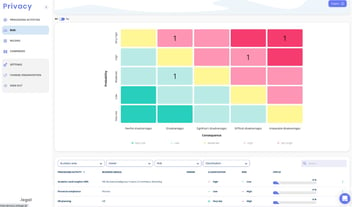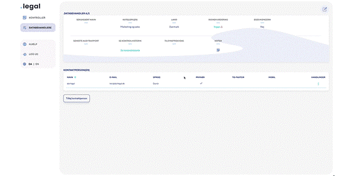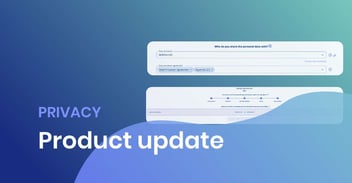Introducing 'Personal Data Types' for Granular Data Mapping
We're excited to announce a new feature in our platform that provides even more flexibility and control when managing personal data across your compliance efforts. Previously, you could register personal data categories on a general level, such as contact details, digital footprints, and health information for your processing activities and systems. This high-level approach has helped you maintain an overview of the types of personal data being processed.
However, we understand that some users need more granularity. Imagine, for instance, your HR department handling specific types of contact information: it's not just a general "contact detail" but particular data points like names, email addresses, and home addresses. In response to your feedback, we've created the 'Personal Data Types' feature to meet this need.
Why This Feature Matters
The new 'Personal Data Types' function allows you to specify exactly which types of personal data are being processed at each level of activity. This helps provide a clearer understanding of how different pieces of data flow through your processes, ensuring a more precise level of compliance and transparency. Importantly, if you find that managing categories at the higher level is still sufficient, there's no need to change—this feature is entirely optional.
Do you want to learn more about Personal Data? Then head to our article on the subject: What is Personal Data?
Getting Started: Activating Personal Data Types
To start using this feature, navigate to Settings and then to Master Data → Data Categories. Here, you'll find the option to activate the new function. Once activated, you can define individual personal data types—such as "Name," "Email Address," or "Physical Address"—and then map these types to the relevant personal data categories that you already use.

mapping process allows you to build on your existing data structure without losing any information. By adding more detailed data types under each category, you gain a richer, more actionable picture of how data is managed.
Using Personal Data Types in Practice
Once you've set up your personal data types and mapped them to categories, you can specify precisely which types are processed under each processing activity. For example, if you're tracking the personal data involved in a recruitment process, you can indicate whether it's a candidate's name, email address, or residential address.

Additionally, the new feature lets you specify where exactly these data points are stored—whether they're kept in specific systems or shared with data processors. This level of detail gives you a comprehensive view of how each piece of data moves through your organisation and helps you stay on top of your compliance obligations.
Try It Now

We believe this feature will greatly enhance your ability to manage personal data, making your compliance processes more detailed, efficient, and transparent. If you haven't done so already, head over to the Settings section to explore the new possibilities with 'Personal Data Types'. As always, we're here to support you, so don't hesitate to reach out if you have questions or need assistance.





.png?width=352&name=Feature%20image_rich%20text%20field%20and%20emails%20(1).png)







.jpeg)

.jpg)
.jpg)



.jpg)

-1.png)



.jpeg)








.jpg)





